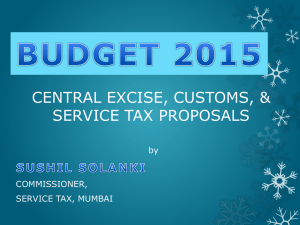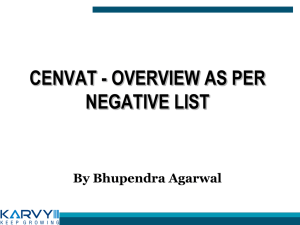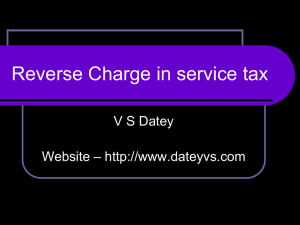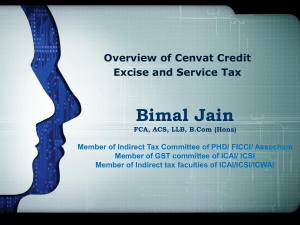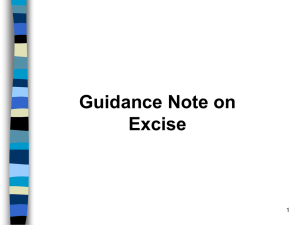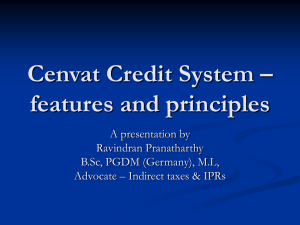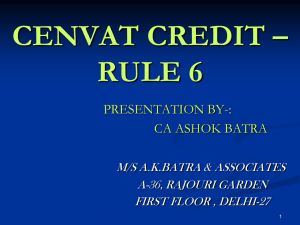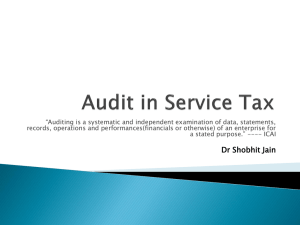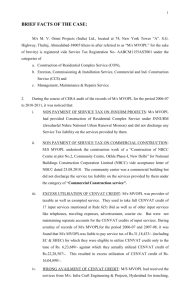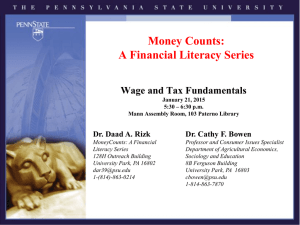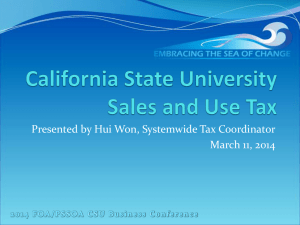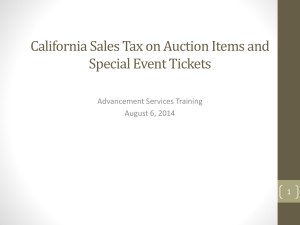Valuation of Taxable Services and CENVAT Credit
advertisement
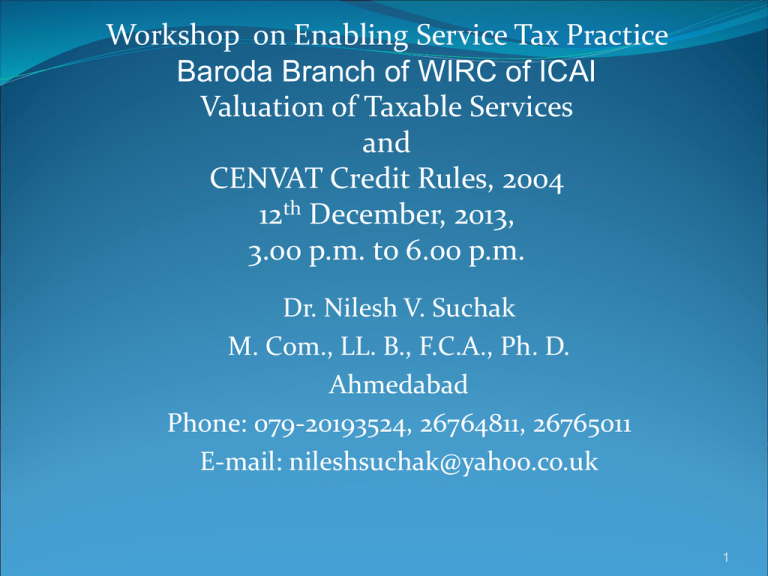
Workshop on Enabling Service Tax Practice Baroda Branch of WIRC of ICAI Valuation of Taxable Services and CENVAT Credit Rules, 2004 12th December, 2013, 3.00 p.m. to 6.00 p.m. Dr. Nilesh V. Suchak M. Com., LL. B., F.C.A., Ph. D. Ahmedabad Phone: 079-20193524, 26764811, 26765011 E-mail: nileshsuchak@yahoo.co.uk 1 Valuation of taxable services for charging service tax Valuation of Taxable Service Section 67(1): Value of taxable services shall be: Gross amount charged by the service provider for such (taxable) service where provision of service is for a consideration in money; ii. Such amount in money as, with the addition of service tax charged, is equivalent to consideration where the provision of service is for a consideration not wholly or partly consisting of money; iii. The amount as may be determined in prescribed manner where the provision of service is for a consideration which is not ascertainable. 2 i. Valuation of taxable services for charging service tax Service Tax (Determination of Value) Rules, 2006 Rule 2A: Determination of value of service portion in the execution of a works contract. i. Value of service portion = Gross amount charged for the works contract – value of property in goods transferred. ii. Where value has not been determined under clause (i), value of service portion shall be as under: A. B. C. For execution of ‘original works’ - 40% of total amount charged for the works contract For works contract for maintenance or repair or reconditioning or restoration or servicing of any goods - 70% of total amount charged for the works contract For any other works contract not covered under (A) and (B) above including maintenance, repair, completion and finishing services such as glazing, plastering, floor or wall tiling, installation of electrical fittings of an immovable property - 60% of total amount charged for the works contract 3 Valuation of taxable services for charging service tax What is Works Contract? Section 65B(54): “works contract” means a contract wherein transfer of property in goods involved in the execution of such contract is leviable to tax as sale of goods and such contract is for the purpose of carrying out construction, erection, commissioning, installation, completion, fitting out, repair, maintenance, renovation, alteration of any movable or immovable property or for carrying out any other similar activity or a part thereof in relation to such property. 4 Valuation of taxable services for charging service tax Determination of value of service in relation to money changing [Rule 2B] Determination of value of service portion involved in supply of food or any other article of human consumption or any drink in a restaurant or as outdoor catering. [Rule 2C] Manner of determination of value. [Rule 3] Rejection of value. [Rule 4] Inclusion in or exclusion from value of certain expenditure or costs. [Rule 5] Cases in which the commission, costs, etc., will be included or excluded. [Rule 6] 5 Valuation of taxable services for charging service tax Issues 1. Mr. A has determined value of service portion in execution of a construction works contract by deducting from the gross amount charged the value of property in goods transferred in the execution of the said works contract. Gross amount charged for the works contract is Rs. 100 crore including VAT and service tax. VAT or sales tax is paid on actual value of property in goods transferred. The service receiver has supplied a Golden Kalash whose fair market value is Rs. 500 crores to be incorporate in construction in the manner desired by service receiver. Will the fair market value of this Golden Kalash be included in value of taxable service provided by Mr. A? 6 Valuation of taxable services for charging service tax Issues 2. Will free supplies of cement or steel by service receiver for construction be included in value of taxable service in the hands of service provider? 7 Valuation of taxable services for charging service tax Issues 2A. Bhayana Builders (P) Ltd. v. CST, Delhi [2013 (32) STR 49 (Tri.LB)]- Implicit in this legislative architecture is concept that any consideration whether monetary or otherwise should have flown or should flow from service recipient to service provider and should accrue to benefit of later. “Free supplies” incorporated into construction (cement or steel for instance), even on extravagant inference, would not constitute nonmonetary consideration remitted by service recipient to service provider for providing service, particularly since no part of goods and materials so supplied accrues to or is retained by service provider. Value of ‘free supplies’ by construction service recipient, for incorporation in constructions would neither constitute non-monetary consideration to service provider nor form part of gross amount charged for services provided. Hence, contrary conclusion in Jaihind Project Ltd. [2010 (18) STR 650 (Tri.-Ahmd)] found to be incorrect, proceeding on flawed interpretation of section 67. 8 Valuation of taxable services for charging service tax Issues 3. Can expenditure/costs, such as travel, hotel stay, transportation, etc., incurred by consulting engineering service provider in course of providing taxable service be treated as consideration for taxable service and included in value for charging Service Tax? 9 Valuation of taxable services for charging service tax Issues 3A. Intercontinental Consultants & Technocrats Pvt. Ltd. v. UOI [2013 (29) S.T.R. 9 (Del.)] – Rule 5(1) purports to tax not what is due from service provider under charging Section 66 of Finance Act, 1994. It is ultra vires Section 67, which quantifies the charge of Service Tax, both before and after its amendment of 1-5-2006. In these Sections phrase ‘for such service’ is important. Such expenditure/costs cannot be considered as amount charged by Service provider ‘for such service’ provided by him. Power to make rules could not exceed or go beyond Section which provides for charge or collection of Service Tax. Apart from being ultra vires, Rule ibid may also result in double taxation, if expenses like air travel tickets, had already been subjected to Service Tax. Also, ‘consideration in money’ or ‘gross amount charged’ used in Section 67 ibid did not have widest sense of including such expenditure/costs. In their definition in Explanation to the section, these expenditure/costs have not been included. Even if Rule ibid is considered to have been made under Section 94 ibid, which provides for delegated legislation, it could only be for carrying out provisions of Chapter V of Finance Act, 1994 which provides for the levy, 10 quantification and collection of the Service Tax. Valuation of taxable services for charging service tax Issues 4. Can components of salary, Bonus, uniform charges etc. payable to security guard/staff and statutory contributions like PF and ESI be included in value of taxable service provided by security agency supplying security personnel? 11 Valuation of taxable services for charging service tax Issues 4A. Hon. Delhi High Court has, in Writ Petition (C) No. 6226/2012 in case of Skylark Securities Pvt. Ltd. passed an interim order on 4th September, 2013, directing the Department that while adjudicating the matter, service tax demanded in respect of components of Salary, ESI, PF, Uniform Charges, Bonus etc. has to be computed separately but restrained the Department from recovery of said service tax from the petitioner providing security service. The High Court has further directed that recovery only can be made in respect of the Service Tax on service charges (other than above-components) of supply of security personnel/manpower supply and other demands shall be subject to the further order of the High Court. 12 Valuation of taxable services for charging service tax Issues 5. Is service tax payable on serving of food and beverages? 5A. Kerala Classified Hotels and Resorts Association v. UOI [2013 (31) STR 257 (Ker.)] – When food or alcoholic beverages were supplied as a part of any service, such transfer was deemed to be a sale. As deeming provision permitted State Government to impose tax on such transfer, there could not be any different component of service which could be imposed with any service tax in exercise of residuary power of Central Government under entry 97 of List I of Constitution of India. 13 Any Questions? Dr. Nilesh V. Suchak M. Com., LL. B., F.C.A., Ph. D. Ahmedabad Phone: 079-20193524, 26764811, 26765011 E-mail: nileshsuchak@yahoo.co.uk 14 CENVAT Credit Rules, 2004 What is CENVAT Credit? Why CENVAT Credit? When can CENVAT Credit be availed? What are the conditions for availment of CENVAT Credit? For what purpose can CENVAT Credit be used? What is Exempted Service? What is Export of Service? Rule 6A of STR 15 CENVAT Credit Rules, 2004 Capital Goods [Rule 2(a)] Input [Rule 2(k)] Input Service [Rule 2(l)] Output Service [Rule 2(p)] 16 CENVAT Credit Rules, 2004 [Rule 3(1)] CENVAT Credit of about 16 different types of duties and taxes paid on input service or capital goods or inputs. No CENVAT Credit of additional duty U/s 3(5) of CTA to provider of output service [Rule 3(2)] CENVAT Credit of duty paid on inputs lying in stock or in process or contained in final products lying in stock to be allowed on the date when goods manufactured cease to be exempted goods or when any goods become excisable. [Rule 3(3)] CENVAT Credit of duty paid on inputs lying in stock on the date on which any service ceases to be exempted 17 service shall be allowed. CENVAT Credit Rules, 2004 [Rule 3(4)] The CENVAT credit may be utilized for payment of – (a) any duty of excise on any final product; or (b) an amount equal to CENVAT credit taken on inputs if such inputs are removed as such or after being partially processed; or (c) an amount equal to the CENVAT credit taken on capital goods if such capital goods are removed as such; or (d) an amount under sub-rule (2) of rule 16 of Central Excise Rules, 2002; or (e) service tax on any output service : Provided No CENVAT Credit of additional duty U/s 3(5) of CTA shall not be utilized for payment of service tax on output service. Explanation. - CENVAT credit cannot be used for payment of service tax in respect of services where the person liable to pay tax is the service 18 recipient. CENVAT Credit Rules, 2004 [Rule 3(5)] The manufacturer of the final products or provider of output service, as the case may be shall pay an amount equal to the credit availed on inputs of capital goods removed as such except for providing output service or for providing free warranty of final product. [Rule 3(5A)] If the capital goods, on which CENVAT credit has been taken, are removed after being used, the manufacturer or provider of output services shall pay an amount equal to the CENVAT Credit taken on the said capital goods reduced by the percentage points calculated by straight line method as specified for each quarter of a year or part thereof from the date of taking the CENVAT Credit. If capital goods removed as waste and scrap, manufacturer shall pay an amount equal to duty leviable on transaction value.19 CENVAT Credit Rules, 2004 [Rule 3(5B)] If the value of any input or capital goods before being put to use is written off fully or partially or where any provision to write off fully or partially has been made in the books of account, then the manufacturer or service provider, as the case may be, shall pay an amount equivalent to the CENVAT credit taken in respect of the said input or capital goods Provided that if the said input or capital goods is subsequently used in the manufacture of final products or the provision of output services, the manufacturer or output service provider, as the case may be, shall be entitled to take the credit of the amount equivalent to the CENVAT credit paid earlier subject to the other provisions of these rules. 20 CENVAT Credit Rules, 2004 [Rule 3(6)] The amount paid under sub-rule (5) and sub-rule (5A) shall be eligible as CENVAT credit as if it was a duty paid by the person who removed such goods under sub-rule (5) and sub-rule (5A). [Rule 3(7)] CENVAT Credit of Education Cess & Secondary and Higher Secondary Education Cess can be used only for payment of Education Cess & Secondary and Higher Secondary Education Cess on taxable service respectively. Explanation.-Where the provisions of any other rule or notification provide for grant of whole or part exemption on condition of non-availability of credit of duty paid on any input or capital goods, or of service tax paid on input service, the provisions of such other rule or notification shall prevail over the provisions of these rules. 21 CENVAT Credit Rules, 2004 Conditions for allowing CENVAT Credit – Rule 4 Refund of CENVAT Credit – Rule 5 Refund of CENVAT Credit to service providers providing services taxed on reverse charge basis – Rule 5B Obligations of a manufacturer or producer of final products and a provider of output service – Rule 6 Manner of distribution of credit by Input Service Distributor(ISD) – Rule 7 22 CENVAT Credit Rules, 2004 Distribution of credit on inputs by office or any other premises of output service provider – Rule 7A Storage of input outside the factory of the manufacturer – Rule 8 Documents and accounts – Rule 9 Information relating to principal inputs – Rule 9A Transfer of CENVAT credit – Rule 10 Transfer of CENVAT credit of additional duty leviable under sub-section (5) of section 3 of the Customs Tariff Act – Rule 10A Transitional provision – Rule 11 23 CENVAT Credit Rules, 2004 Special dispensation in respect of inputs manufactured in factories located in specified areas of North East region, Kutch district of Gujarat, State of Jammu and Kashmir and State of Sikkim – Rule 12 Procedure and facilities for a large taxpayer – Rule 12A Power to impose restrictions in certain types of cases – Rule 12AAA Power of Central Government to notify goods for deemed CENVAT Credit – Rule 13 Recovery of CENVAT Credit wrongly taken or erroneously refunded – Rule 14 24 CENVAT Credit Rules, 2004 Confiscation and penalty – Rule 15 General penalty – Rule 15A Supplementary provision – Rule 16 25 CENVAT Credit in respect of Commission Is CENVAT Credit allowed in respect of commission paid to agents on sales? CCE v. Cadila Healthcare Ltd. [2013 (30) S.T.R. 3 (Guj.)] – Nothing on record to indicate that foreign agents they were actually involved in any sales promotion activities like advertising, covered in inclusive part of definition of input service. Agents were directly concerned with sales rather than sales promotion . Services provided by them was neither Business Auxiliary Service under Sections 65(19) and 65(105)(zzb) of Finance Act, 1994 nor were they covered in main or inclusive part of definition of input service in Rule 2(l) of Cenvat Credit Rules, 2004. It was not used directly or indirectly in or in relation to manufacture of final products or clearance of final products from place of removal. It was not analogous to illustrative activities mentioned in the Rule 2(l) ibid viz., accounting, auditing, etc., and therefore, do not fall within ambit of “activities relating to business”. In that view, it was not eligible for Cenvat credit. Sales promotion targets large population of consumers. It is intended to improve sales, and includes activities like advertising, organizing competitions, providing free gifts and samples, demonstrations, discounts, exhibitions or tradeshows, games, giveaways, point-of-sale displays, merchandising, and similar activities. 26 THANK YOU Dr. Nilesh V. Suchak M. Com., LL. B., F.C.A., Ph. D. N. V. Suchak & Co., Chartered Accountants, 314, Satyam Mall, Opp.: Saman Complex, Near Vishveshwar Temple, Vastrapur, Ahmedabad-380015. Gujarat Phone: 079-20193524, 26764811, 26765011 E-mail: nileshsuchak@yahoo.co.uk 27
